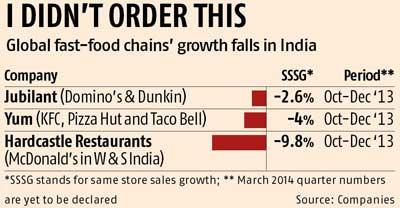 Multinational companies, by and large, have similar products across markets.
Multinational companies, by and large, have similar products across markets.
However, international fast-food chains have had to change this business model completely, to adapt to Indian preferences.
For instance, Pizza Hut, known globally for its pizzas, is counting on rice and vegetarian dishes to grow revenue in India.
Items such as vegetable biryani and rice bowls, introduced in recent months, are expected to give the company about a tenth of its turnover in one year.
Dunkin’ Donuts, globally known for its doughnuts and coffee, already gets a third of its revenue from burgers, wraps and sandwiches, something it introduced only last year.
Starbucks, known for its take-away culture in the US, its biggest market, has had to reinvent itself as a sit-in restaurant-cum-cafe chain, since Indians simply don’t enjoy picking up stuff on the go.
So, while India is a must-go for most of these, adapting to conditions here is a challenge.
And, fast-food chains have had to respond quickly for survival and to grow.
The reinvention also comes when same-store sales growth (SSSG) of most fast-food chains in India is down to low single digits, due to the cut in spending on discretionary items. In some cases, SSSG is in the red (see chart).
Sanjiv Razdan, general manager, Pizza Hut & Restaurants, says, “To stay relevant in every part of the country, we re-invent. And, rice-rich preparations would certainly catch those who don’t eat pizzas.”
What is pushing Pizza Hut to revamp its business model is the percentage drop in revenue share of its core product.
“The revenue share of pizzas is coming down by four-five percentage points.
"By 2020, we expect contribution from pizzas to come down to 40 per cent from 60 per cent now,” says Razdan.
This even as pizzas continue to be its dominant business abroad.
Dunkin’ Donuts, which launched its first outlet in India in April 2012,
 “India is a little different from the US. Consumption of doughnuts and coffee happens most in the mornings there. Indians, on the other hand, don’t consume fast-food in the mornings.
“India is a little different from the US. Consumption of doughnuts and coffee happens most in the mornings there. Indians, on the other hand, don’t consume fast-food in the mornings. It begins a little later, between noon and 7 pm. And, yes, savoury products are popular.
So, we have added it in our menu here,” says Dev Amritesh, president and chief operating officer, Dunkin’ Donuts India.
Given the pace at which the savoury segment has grown at Dunkin Donuts, analysts estimate it could become a key contributor to revenue, as much as half of its top line in two-three years.
Amritesh declines to give numbers.
However, Dunkin’ Donuts isn’t alone in responding to Indians’ characteristics. Rival Krispy Kreme is promoting its eggless doughnuts in a big way in Delhi, to get vegetarians to try out its products.
The idea is to get as many people as possible to sample the product, since that will push up sales.
The same goes for KFC, which increased its vegetarian offering recently, realising that chicken, its core product, might not be sufficient for growth.
“We saw an opportunity to deliver a significant vegetarian range and thereby reach a broader target audience,” says Dhruv Kaul, director, marketing.
Paneer Zinger, introduced recently, has already captured 30 per cent of KFC’s sales of vegetarian products.
Other popular products such as twisters, strips and burgers have all helped increase KFC’s rate of growth on the vegetarian side.
According to Kaul, sales from vegetarian offerings have grown 70 per cent in the past few weeks, and if the pace persists, KFC could be getting 20 per cent of its revenue from vegetarian items in a year’s time, from 14 per cent now.










 © 2025
© 2025